Home | Category: Basic Christian Beliefs
CHRISTIAN BELIEFS
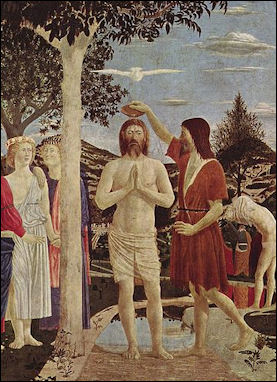
Baptism of Christ
by Piero della Francesca Christians believe that there is only one God and recognize Jesus as the Son of God who was sent to save mankind from death and sin. The Bible is the basis of Christian beliefs Jesus’s teachings can be summarized, briefly as the love of God and love of one's neighbor. Jesus said that he had come to fulfill God's law rather than teach it. [Source: BBC, August 14, 2009 |::|]
Christians believe that Jesus Christ is the Son of God and that his Crucifixion and subsequent Resurrection (rising from the dead) make up for the sins of humankind. A belief in Jesus and his suffering leads to salvation. God is also known as the Lord or the Father. Jesus is believed to be the Son of God. The concept of the Trinity makes God a combination of God the Father, the Son, and the Holy Spirit. In Christianity, there is a belief that God took on bodily form through Jesus Christ, making Jesus at once fully human and fully divine.[Source: Encyclopedia.com]
According to the BBC: “Christians believe in justification by faith — that through their belief in Jesus as the Son of God, and in his death and resurrection, they can have a right relationship with God whose forgiveness was made once and for all through the death of Jesus Christ. Some believe that Christians belief in the Trinity — the God as Father, Son and Holy Spirit — means that Christians believe in three separate gods, which they don't. Christians believe that God took human form as Jesus Christ and that God is present today through the work of the Holy Spirit.
Websites and Resources on Christianity BBC on Christianity bbc.co.uk/religion/religions/christianity ; Candida Moss at the Daily Beast Daily Beast Christian Answers christiananswers.net ; Christian Classics Ethereal Library www.ccel.org ; Sacred Texts website sacred-texts.com ; Internet Sourcebook sourcebooks.fordham.edu ; Christian Denominations: Holy See w2.vatican.va ; Catholic Online catholic.org ; Catholic Encyclopedia newadvent.org ; World Council of Churches, main world body for mainline Protestant churches oikoumene.org ; Online Orthodox Catechism published by the Russian Orthodox Church orthodoxeurope.org
RECOMMENDED BOOKS:
“Christian Beliefs, Revised Edition: Twenty Basics Every Christian Should Know”
by Wayne A. Grudem and Elliot Grudem Amazon.com ;
“Mere Christianity” by C. S. Lewis Amazon.com ;
“Cold-Case Christianity: A Homicide Detective Investigates the Claims of the Gospels
by J. Warner Wallace Amazon.com ;
“The Mosaic of Christian Belief: Twenty Centuries of Unity and Diversity”
by Roger E. Olson Amazon.com ;
“Creeds, Confessions, and Catechisms: A Reader's Edition” by Chad Van Dixhoorn Amazon.com ;
“The Story of Creeds and Confessions: Tracing the Development of the Christian Faith”
by Donald Fairbairn and Ryan M. Reeves Amazon.com ;
“Christian Doctrine” by Shirley C. Guthrie Jr. Amazon.com ;
“Concise Theology: A Guide to Historic Christian Beliefs” by J. I. Packer Amazon.com ;
“Christian Theology” by Millard J. Erickson Amazon.com ;
“Christian Theology: An Introduction” by McGrath Amazon.com ;
“Christianity: The First Three Thousand Years” by Diarmaid MacCulloch, Walter Dixon, et al. Amazon.com ;
“A History of Christianity” by Paul Johnson, Wanda McCaddon, et al. Amazon.com
Christian Doctrines
A doctrine is a set of ideas held by a religious group. Catechesis is the formal instruction in the faith. The central belief in Christianity is that Jesus is the Son of God and the Savior of humankind. By believing in Jesus's death and Resurrection, people can be saved. Their sins can be redeemed, and they can find eternal life in heaven after death. "I am the way," Jesus said in John 14:16, "and the truth, and the life; no one comes to the Father, but by Me." These words took on new meaning following the death and Resurrection of Jesus. [Source: Encyclopedia.com]
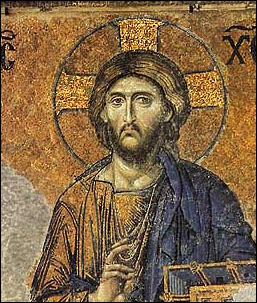
Christ in Hagia Sophia The basic doctrines of Christianity are 1) the Incarnation, which states that God was present in Jesus throughout his life but did not interfere with his being and human being (according to Corinthians 5: 19, “God was in Christ reconciling himself.”); 2) Christology, which says that Christ was a person in which the human and divine were always present; 3) the Trinity, which holds that God reveals himself through the Father (God), Son (Jesus) and the Holy Ghost; and 4) Atonement, the belief that Jesus died for the sins of everyone who has faith in God.
Other key articles of faith include 1) the divine creation of the universe; 2) human sinfulness; 3) Christ's reconciliation of man to God; 4) the operation of the Holy Spirit within the Church; and the duty of the faithful to fulfill God's purpose for his creation. [Source: Encyclopedia.com]
Sins are generally regarded as breaking the commandments. Thomas Aquinas described the Seven Deadly Sins: sloth, gluttony, pride, anger, envy, greed, and lust. The possibility of grace and redemption being available for to all sinners was the essence of Jesus's teachings. The Christian version of Confucius's Golden Rule (Matthew 7:12) is : "Therefore all things whatsoever ye would that men should do to you, do ye even so to them: for this is the law of the prophets."
Christian Creeds
A creed is a statement of belief or basic principles. Christian doctrines have traditionally been defined by Creeds, viewed as fundamental beliefs accepted by all Christians or all members of a particularly sect, that are thus distinguished from speculations and views that are still a matter of debate. Creeds are usually expressed in succinct formulae. Some were inherited from Judaism and other were agreed upon at the ecumenical councils.
A creed can also defined as a confession, symbol, statement of faith or a statement of the shared beliefs of a religious community in the form of a fixed formula summarizing core tenets. The have been numerous creeds made by later followers in large church councils and not included in the New Testament. The life and deeds of Jesus portrayed in the Gospels are considered the heart of Christianity. These later creeds record the attempts of followers to make sense of the teachings of Jesus and to combine them in an organized body of thought and belief. Not all Christians agreed on all creeds, and this, among other differences, led to an array of Christian denominations. [Source: Encyclopedia.com]
One of the most widely used creeds in Christianity is the Nicene Creed, first formulated in AD 325 at the First Council of Nicaea. It was based on Christian understanding of the Canonical Gospels, the letters of the New Testament and to a lesser extent the Old Testament. Affirmation of this creed, which describes the Trinity, is generally taken as a fundamental test of orthodoxy for most Christian denominations. The Apostles' Creed is also broadly accepted. Some Christian denominations and other groups have rejected the authority of those creeds. [Source: Wikipedia]
The Nicene Creed goes: I believe in one God, the Father almighty, maker of heaven and earth, of all things visible and invisible.
I believe in one Lord Jesus Christ, the Only Begotten Son of God, born of the Father before all ages. God from God, Light from Light, true God from true God, begotten, not made, consubstantial with the Father; through him all things were made. For us men and for our salvation he came down from heaven, and by the Holy Spirit was incarnate of the Virgin Mary, and became man. For our sake he was crucified under Pontius Pilate, he suffered death and was buried, and rose again on the third day in accordance with the Scriptures. He ascended into heaven and is seated at the right hand of the Father. He will come again in glory to judge the living and the dead and his kingdom will have no end.
I believe in the Holy Spirit, the Lord, the giver of life, who proceeds from the Father and the Son, who with the Father and the Son is adored and glorified, who has spoken through the prophets.
I believe in one, holy, and apostolic Church. I confess one Baptism for the forgiveness of sins and I look forward to the resurrection of the dead and the life of the world to come. Amen. [Source: Catholic Bishops]
Christian Theology
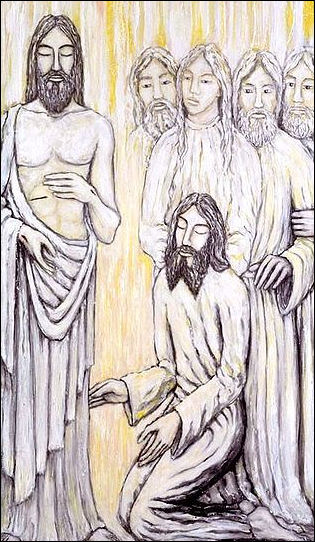
Christ Appears by Rossakiewicz Theology according to historian Daniel Boorstein was "a Western creation nurtured in Hellenist Alexandria" and was "both a producer and a by-product of Christianity." Whereas the myth of the Gods and philosophy were separated under the Greeks. They were united in theology as Moses was made into a philosopher as well religious leader.
It has been said Christian belief it does not constitute a philosophy — a metaphysical system like Platonism or Aristotelian thought. Although Christian doctrine does embrace metaphysical beliefs it differs from traditional philosophical systems in its emphasis on faith over reason. Christianity is rooted in historical events that are regarded as revelatory. At a basic level Christian literature affirms a number of "religious facts," or "facts of faith" — incidents from the life and death of Jesus witnessed by the the apostles and described in the four New Testament gospels. [Source: Encyclopedia.com]
Theology was largely developed by people that lived after Jesus’s death. They took Jesus’s teachings and 1) defined and interpreted them, 2) reasoned out controversial issues, inconsistencies and contradictions, and 3) expanded on Jesus’s teaching ro embrace things like eternal life, salvation and redemption. Most of the key theological issues that come to define Christianity were worked in the five centuries after Jesus’s death. Casuistry, a type of moral reasoning based on the examination of specific cases, is important in Christian theology.
Philo of Alexandria (late first century B.C. to first century A.D.) is considered the father of theology. A rich Jewish nobleman, who was regarded a quite a fun-loving guy, he was one of the first to scrutinize Jewish-Christian doctrine using Platonic philosophical reasoning. Another influential thinker was Origen (185?-254), an Alexandrian Greek who castrated himself to ensure his purity and became head of the leading Christ theological academy at the age of 18. He is credited with giving Christianity some analytical credibility by incorporating elements of Greek philosophy but was unsuccessful making it hold up to the scrutiny of history.
Christian theology seeks to understand God and Jesus and their relation to the world and humankind. It is based on the Bible — both the Old and New Testaments — as interpreted in the light of tradition, reason, and experience. The 11th century theologian Anselm of Canterbury described theology as fides quaerens intellectum, or "faith seeking understanding." Michael J. McClymond wrote in the “Worldmark Encyclopedia of Religious Practices”Faith does not exclude intellectual inquiry but rather invites it. Christians have generally been more concerned with orthodoxy (correct doctrinal expression) than have the adherents of other religions. Judaism and Islam have been more preoccupied with orthopraxy (right practice). Buddhists and Hindus have tended to be flexible about doctrines, seeing them as guidelines rather than fixed standards of belief. Thus, in many ways Christianity is the most theological of the major religions. [Source: Michael J. McClymond, “Worldmark Encyclopedia of Religious Practices”, 2000s, Encyclopedia.com]
See Separate Article: EARLY CHRISTIAN BELIEFS AND THEOLOGY factsanddetails.com ; EARLY CHRISTIAN THEOLOGIANS factsanddetails.com
Incarnation
The doctrine of Incarnation holds that Jesus was both man and God at the same time. According to this creed, God the Father became incarnate, or took on bodily form, for the sake of humanity. It was not that Jesus was half human and half divine. Rather, as the Council of Nicea decided in 325, Jesus was of the same substance as God the Father. [Source: Encyclopedia.com]
On one hand, the Gospels depict Jesus as a human that epxeriences temptation, pain, hunger, fatigue, ignorance, and sorrow. But on the other hand time they affirm that he is Lord, Messiah (Christos ), the Son of God. This extremely exalted view reaches its highest expression in the Fourth Gospel, John, which says in its prologue to Jesus' life that the Word, which was in the beginning with God, and was God, and through which all things were made, "became flesh, and dwelt among us, full of grace and truth; and we have beheld his glory, glory as of the only Son from the Father" (John 1:14). According to Encyclopedia.com: The faith that Jesus was the Christ apparently arose out of a practical acceptance of his status as one who had authority to forgive sins, to declare God's mind toward man, to reveal the true meaning of the divine Law, to heal diseases, and to assume that men's eternal destiny and welfare was bound up with their responses to him. This practical acknowledgment of his unique authority probably crystallized into conscious conviction as to his deity under the impact of the resurrection events.
In the gospels these two beliefs, identifying Jesus both as a son of man and as the Son of God, occur together without any attempt to theorize about the relationship between them. Thus, this primary stratum of Christian literature contains, as data for theological reflection, reports of (a ) the publicly observable fact that Jesus was a man, and (b ) the fact of faith that he was divine, in that "in him all the fullness of God was pleased to dwell" (Colossians 1:19).
During its first four centuries of life these data provided the church with its chief intellectual task. The eventual outcome of the Christological debates, formalized by the Council of Chalcedon (451), was not to propound any definitive theory concerning the relationship between Jesus' humanity and his divinity but simply to reaffirm, in the philosophical language of that day, the original facts of faith. The various views that were from time to time branded as heretical came under this condemnation because directly or by implication they denied one or the other of the two fixed points of Christian thought in this field, the human and divine natures of Christ.
The first of the Christological heresies, the Docetism of some of the Gnostics in the first and second centuries, denied the real humanity of Christ, suggesting that he was a human being in appearance only. The motive behind this theory was to exalt his divine status, but the effect was to deny one of the foundation facts of Christianity as historically based faith. The next great heresy, Arianism, in the fourth century, went to the opposite extreme, denying continuity of being or nature between the Godhead and Christ and regarding him as a created being, so that "there was a time when he was not". It was in the controversy with Arianism that the notion of substance became a key category in the Christological debates. Arius declared that the Son was “of like substance with the Father”, whereas the Council of Nicaea (325), excluding Arianism as a heresy, insisted that the Son was “of the same substance as the Father.. It was made clear by Athanasius, the champion of orthodoxy, that the iota's difference between these formulations involved an immense religious difference, for only a savior who came from the Godward side of creation could offer man an ultimate salvation. This Homousian Christology was reaffirmed by the Council of Chalcedon and has ever since been the position of the main streams of historic Christianity.
Heaven and Salvation
Although the concept of an afterlife may vary between denominations and individuals, many Christians believe in some kind of heaven, in which believers will live with God and other believers after death. While the actual nature of this life is not known, Christians believe that many spiritual experiences in this life help to give them some idea of what eternal life will be like. According to Encyclopedia.com: Views differ as to whether those of other faiths or those of no faith will be in heaven. Concepts of what heaven will be like differ as well. Fewer Christians believe in the existence of hell, where unbelievers or sinners are punished. There is also no complete agreement as to whether hell is eternal and whether its punishment is spiritual or physical. Some Christians reject the notion of hell altogether. [Source: Encyclopedia.com]
One of the things that makes Christianity different from other religions is the emphasis on free will and the conversion process. Many saints had deeply moving conversion experiences or visions, In “Varieties of Religious Experience” . William James wrote: “A genuine first-hand religious experience...is bound to be a heterodoxy to its witnesses: the prophet appearing as a mere lonely madman. If his doctrine proves contagious enough to spread to any others, it becomes a definite and labeled heresy. But if then still proves contagious enough to triumph over persecution, it becomes itself an orthodoxy, and when a religion has become an orthodoxy, its day of inwardness is over: the spring is dry: the faithful live at second hand exclusively and stone the prophets on their turn.”
Salvation means deliverance from sin and its consequences. Christians believe this is a result Jesus Christ's dying on the cross and grace — the unmerited gift from God for human salvation For Christians, belief in the Atonement of Jesus is the way to salvation. Through salvation is believed one can attain eternal life. In Romans 10:9: Paul says: If you confess with your mouth that Jesus is Lord and believe in your heart that God raised him from the dead, you will be saved. See Atonement and Eternal Life Below
The modern concept of salvation is something that developed over time. The original notion professed by Paul was intended to free man from rigid Jewish laws, saying all that was necessary to receive the grace of God was having a willingness to follows his “Way." This was taken to mean that salvation was achieved by living a Christian life, performing good deeds and conducting oneself in a moral way.Later salvation came to mean the reward that one received after deciding to devote oneself to Christ. The key scripture here from John): Jesus said, “Let not your heart be troubled; ye believe in God, believe also in men. In my Father’s house are many mansions: if it were not so, I would have told you. I go to prepare a place for you...that where I am, there ye may be also.” The idea here was that salvation occurs first and moral conduct will follow as a natural consequence.
Conversions: See Separate Article: ST. PAUL: HIS LIFE, CONVERSION AND DEATH europe.factsanddetails.com ; ST. AUGUSTINE: HIS LIFE, CONFESSIONS AND CONVERSION europe.factsanddetails.com ; ST. FRANCIS: HIS LIFE STORY, CONVERSION, TRAVELS, STIGMATA europe.factsanddetails.com
Salvation: See: MEANING OF JESUS'S DEATH: ATONEMENT, SALVATION AND REDEMPTION africame.factsanddetails.com
Resurrection and Its Meaning
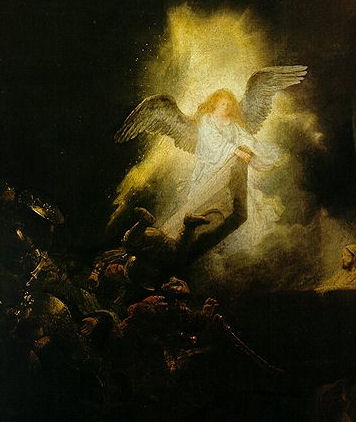
Resurrection by Rembrandt Resurrection refers to the rising of Jesus Christ from the dead three days after his Crucifixion, or death on a cross. Christians believe Jesus rose from dead after he was buried as he told his followers he would. This event is remembered with the religious day of Easter. According to the most widely accepted account of the Resurrection, on Sunday after Jesus’s death, he rose, terrifying the guards. Later he appeared in the flesh to Mary Magdalene, the Apostle Peter and his disciples. To show them it was really him, Jesus showed them the wounds on his feet, hands and side.
Michael Symmons Roberts wrote for the BBC: “The belief that Jesus had been raised from the dead became the foundation of the early Christian Church. What the early Christians made of the resurrection can be gleaned from the letters of St Paul, the Gospels and the Acts of the Apostles. It is a complex picture: did the early Christians believe that Jesus had undergone a spiritual or physical resurrection? The earliest sources are the letters of St Paul. His belief in the resurrection of Jesus is based on a vision of the risen Jesus on the road to Damascus. Like the letters of St Paul, the Gospel writers also report appearances of Jesus to the disciples. But the evangelists also report the story of the empty tomb - the discovery of the disappearance of the corpse of Jesus from his tomb on the third day after his crucifixion. The clear implication from this account is that the early Christians took Jesus to have been physically raised from the dead. [Source: Michael Symmons Roberts, BBC, September 18, 2009 |::|]
“That in itself would have been hailed as a miracle. But a series of religious experiences convinced the early Christians that the resurrection meant much more than that. First, Jesus was the divine son of God. The Acts of the Apostles reports that during the feast of Pentecost the disciples were gathered together when they heard a loud noise like a wind from heaven, and saw tongues of fire descend on them. The Bible says they were filled with the Holy Spirit - and they took that as a sign that Jesus had been resurrected by God. The experience brought about a sudden and powerful transformation in the disciples. Until then Jesus had been a memory. Now for the first time Jesus became the focus of something unprecedented. A new faith flickered into life, a faith that worshipped Jesus as the son of God. |::|
See Separate Articles RESURRECTION OF JESUS africame.factsanddetails.com and MEANING, SIGNIFICANCE AND INTERPRETATIONS OF THE RESURRECTION africame.factsanddetails.com
Atonement and the Meaning of Death of Jesus
Atonement and redemption represent the belief that Jesus died for the sins of everyone who has faith in God. It holds that Jesus died for the sins of humanity so the faithful, people who accepted Jesus into their hearts, could ascend to heaven and have eternal life, despite their sins. The Apostle Paul wrote: “God shows his love for us in that while we were yet sinners, Christ died for us...We are now justified by his blood.”
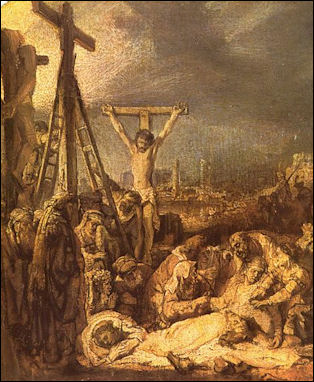
Lament the Dead Christ by Rembrandt Atonement essentially means that Jesus accepted the pain of death to show, through his Resurrection, that God and his love are not defeated by death. His sacrifice was a kind of compensation for all the sins that have ever been committed by humankind, allowing sinners — which is more or less everyone — to achieve salvation and have a relationship with God. According to I John 3:16: “This is the proof of love, that he laid down his life for us, and we ought to lay down our lives for our brothers.”
The word Atonement essentially means oneness with god (“at-one-ment”) and describes the desire by humans to have a relationship with God and achieve this by reaching a sinless state often by suffering or offering penitence. According to John, Jesus was aware of his atonement when he said, “I am the living bread which came down from heaven; if anyone eats this bread, he will live forever; and the bread which I shall give for the life of the world is my flesh.”
Redemption describes the process — through Christ’s death — that atonement can be achieved by absolving oneself of one’s sins. Both concepts have their roots in Jewish sacrifices. According to Hebrews in the New Testament, Jesus killed “not the blood of goats and calves but his own blood, thus securing eternal redemption.”
See Separate Articles: MEANING OF JESUS'S DEATH: ATONEMENT, FORGIVENESS AND RECONCILIATION africame.factsanddetails.com
Original Sin
Some Christians believe all of humanity is born with a built-in urge to do bad things. They believe original sin stems from Adam and Eve's disobedience to God. According to the BBC: Original sin is an Augustine Christian doctrine that says that everyone is born sinful. This means that they are born with a built-in urge to do bad things and to disobey God. It is an important doctrine within the Roman Catholic Church. The concept of Original Sin was explained in depth by St Augustine and formalised as part of Roman Catholic doctrine by the Councils of Trent in the 16th Century. [Source: September 17, 2009 BBC |::|]
“Original sin is not just this inherited spiritual disease or defect in human nature; it's also the 'condemnation' that goes with that fault. Some Christians believe that original sin explains why there is so much wrong in a world created by a perfect God, and why people need to have their souls 'saved' by God. Original sin is a condition, not something that people do: It's the normal spiritual and psychological condition of human beings, not their bad thoughts and actions. Even a newborn baby who hasn't done anything at all is damaged by original sin. |::|
“In traditional Christian teaching, original sin is the result of Adam and Eve's disobedience to God when they ate a forbidden fruit in the Garden of Eden. |Original sin affects individuals by separating them from God, and bringing dissatisfaction and guilt into their lives. On a world scale, original sin explains such things as genocide, war, cruelty, exploitation and abuse, and the "presence and universality of sin in human history". |::|
See Separate Article: ORIGINAL SIN europe.factsanddetails.com
The Trinity
While Christianity is monotheistic, it also holds the concept that the single, eternal God is composed of the Father, the Son, and the Holy Spirit. This three-in-one concept of God was the source of great debate in early centuries of Christianity. [Source: Encyclopedia.com]
Christians believe that God manifests himself through the Holy Trinity: Father (God), Son (Jesus Christ) and the Holy Ghost (or Holy Spirit). Resolving the Holy Trinity with the doctrine of monotheism took centuries and tricky metaphysical maneuvering to work out and was a divisive issue in the early days of Christianity and remains something that many ordinary people can’t comprehend.
Through the concept of the Holy Trinity the Father (God) remains something that exist outside of our world in a kind of parallel universe, while Jesus was a divine man who came to earth and departed and the Holy Ghost is a facade of God that remains with us in the world, in our universe.
According to the BBC: “A difficult but fundamental concept within Christianity, the Trinity is the belief that God is three separate persons but is still a single God. Christianity adopted this complicated idea of God because it was the only way they could make sense of One God in the context of the events and teaching of the Bible. The idea of the Trinity does not supersede monotheism; it interprets it, in the light of a specific set of revelatory events and experiences. [Source: BBC, July 21, 2011 |::|]
See Separate Article: THE HOLY TRINITY europe.factsanddetails.com
Immaculate Conception, Virgin Birth and the Assumption
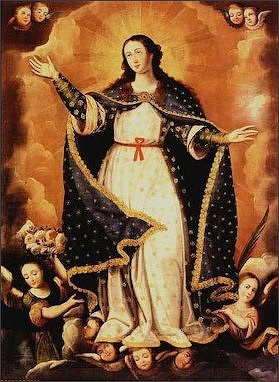
Immaculate Conception
The doctrine of the Immaculate Conception teaches that Mary, the mother of Christ, was conceived without sin and her conception was thus immaculate. Mary's mother was St. Anne. Mary's sinless conception is the reason why Catholics refer to Mary as "full of grace". The Feast of the Immaculate Conception is celebrated by Catholics on December 8th each year. [Source: August 2, 2011, BBC |::|]
According to the BBC: “ There are two mistakes that people often make about the Immaculate Conception: 1) Many people confuse the Immaculate Conception with the "virgin birth"; the belief that Mary gave birth to Jesus while remaining a virgin. They are not the same thing. 2) A less common mistake is to think that the Immaculate Conception means that Mary was conceived without sexual intercourse. In fact Mary had ordinary human parents who conceived her in the usual manner.” |::|
Mary is said to have been a virgin when Jesus was born. The conception of Jesus and the virgin birth is addressed the The Annunciation, which describes the conception of Jesus by the power of the Holy Spirit. The Annunciation holiday is celebrated nine months before Christmas on March 25. The Annunciation (“Announcement”) marks the announcement by an angel that Mary will become pregnant and give birth to Jesus. According to the Bible, Mary became mysteriously pregnant while a virgin betrothed to Joseph, who considered divorcing he
According to the BBC: Roman Catholics believe the doctrine of the Assumption, which teaches that at the end of her life, Mary, the mother of Christ, was taken body and soul (i.e. both physically and spiritually) into heaven to live with her son (Jesus Christ) for ever. Human beings have to wait until the end of time for their bodily resurrection, but Mary's body was able to go straight to heaven because her soul hadn't been tainted by original sin. [Source: July 21, 2011, BBC |::|]
See Separate Article: MARY AND THEOLOGY: VIRGIN BIRTH, THE ASSUMPTION, IMMACULATE CONCEPTION europe.factsanddetails.com
Difference Within Christianity
There are a number of beliefs not necessarily held by all denominations or that have different interpretations by different gorups.. According to Encyclopedia.com: Some hold a firm belief in the historical Crucifixion and Resurrection of Jesus. Not all denominations believe in the virginity of Mary and thus in the virgin birth of Jesus. Some believe that Jesus was the messiah who was foretold by the Jews or that Jesus will return in the so-called Second Coming and will judge all humans and receive, or allow into salvation, those who are faithful. Many believe that the Bible was inspired by God but written by humans and is the first and last word of authority for Christianity. Christians believe more or less strongly in each of these doctrines, depending on their denominations.
Christianity grew out of Judaism and the two religions share many beliefs (See Judaism). Whether the Bible should be taken literally or not remains a contentious issue. The great 5th century Christian theologian St. Augustine is among those who argue that Genesis was not intended to be taken literally.
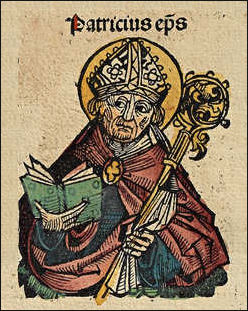
Saint Patrick, an early Christian missionary Michael J. McClymond wrote in the “Worldmark Encyclopedia of Religious Practices”: Roman Catholic and Orthodox Christians make individual opinion and private interpretation in understanding Scripture subordinate to the inherited traditions of the church. By contrast, Protestants make the text of the Bible the final authority. During the past three centuries many Christian thinkers have emphasized human reason as much as Scripture or tradition. The Enlightenment taught that human beings must use their own reason to evaluate all truth claims, including the texts of the Bible and the traditions of the church. Pietistic and Pentecostal Christians claim that theology emerges from personal experience, which can be a source and test of theological truth. Thus, today Christian theology involves a complex interplay of Scripture, tradition, reason, and experience. [Source: Michael J. McClymond, “Worldmark Encyclopedia of Religious Practices”, 2000s, Encyclopedia.com]
Saints are important in Christianity and different ones are important to different groups. The word saint is most commonly used to refer to a Christian who has lived a particularly good and holy life on earth, and with whom miracles are claimed to have been associated after their death. The formal title of Saint is conferred by the Roman Catholic and Orthodox Churches through a process called canonisation. Members of these Churches also believe that Saints created in this way can intercede with God on behalf of people who are alive today. This is not accepted by most Protestants. |In the Bible, however, the word saint is used as a description of anyone who is a committed believer, particularly by St. Paul in the New Testament (e.g. Ephesians 1.1. and 1.15). |:
Christianity, Individuality and Democracy
Early Christianity stressed equality and democracy. Jesus denounced anyone who attempted to usurp the moral authority of God. Catholics introduced a Roman-like hierarchy. Some Protestant denominations tried to revive the early egalitarian, democratic model.
Modern democracy is a secularized version of the Christian doctrine of universal human equality. The notions of individual rights, the rule of law and prosperity based on economic freedom also have their roots in Christian thought.
Jesus individualized the relationship between humans and God. Within Christian thinking, each individual forms a personal relation with God based on their own personal faith (this contrasts with Judaism where an individual relationship with God is based on covenants made between God of people like Abraham, Moses and David). Christ often did his work one person at a time.
The adoption of a particular set of beliefs or doctrines has often been made more for political reasons than religious ones as was the case when Constantine converted the Roman Empire and Catholic or Protestant were pressured and killed in the Reformation and Counter-reformation.
Proselytizing and Missionaries
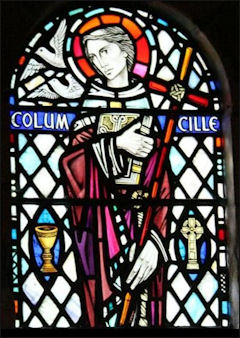
Saint Columba,
another early Christian missionary Christianity has traditionally been a proselytizing religion spread around the world by missionaries. This is based at least partly on the belief that the message of salvation was offered to everyone and this “Good News” (the meaning of “Gospels”) should be spread by everyone who has experienced it. Missionaries respond to the plea in Matthew: “Therefore go and make disciples of all nations, baptizing them in the name of the Father and the Son and of the Holy Spirit, and teaching them to obey everything I have commanded you.” They also follow the example of St. Paul and St, Francis.
Nearly all branches of Christianity have utilized missionaries in one form or another. These days most mainstream Protestant and Catholic missionary groups stick to operating social programs and helping the poor. Generally the groups that most actively proselytize are evangelicals. Many of the Evangelical get day jobs as engineers, English teachers and nurses and evangelize in their spare time.
Christian missionaries have helped bring education and medical care to remote parts of the world, helped preserve some culture that might have been swallowed up economic forces and assimilation and brought written languages to places that didn’t have one.
For a long time most missionaries were active in Latin America, where the battle for primacy was fought between evangelicals and Catholics, with the more adventurous going to Africa and the Communist world. In the last few decades there has been more of an emphases on reaching “unreached people groups” that include tribes in remote areas and Muslims, Hindus and Buddhists who have never been exposed to Christianity.
Modern technology, wealth, globalization and an endless supply of enthusiastic missionaries willing to travel to the ends of the earth and find those who have not heard the word have helped spread Christianity at an unprecedented rate. There is a wealth of material available on the Internet as well as was “Godcasting” sites for iPods.
Miracles and Christianity
Miracles have always played a big part in winning converts to Christianity. They have come in the form of bleeding paintings of the Virgin Mary, talking images, miracle-working icons and saint's bones and frescoes that have been scraped off the wall and mixed with water and oils poured through the coffins of dead saints and drunk as a medicine.
British historian Robin Cormack wrote in the New York Times, "What could better demonstrate Christ's life on earth than a picture that shared all his powers of healing? Who needed to listen to theological quibbling over the nature of Christ if an icon could speak a thousand words?"
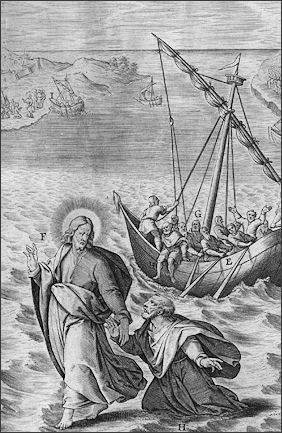
walking on water In the early church miracles were performed by saints while they were alive. Later on, beginning in medieval times, most miracles were attributed to saints and others after they died.
On miracles, Biblical scholar Reynold Price wrote in Time: “I am one who believes himself a direct recipient of such care. Fifteen years ago, as I was about to undergo five weeks of withering radiation for a 10-inch-long cancer inside my spinal chord, I found myself — an outlaw Christian who had, and has, no active tie with a church — transported, thoroughly awake, to another entirely credible time and place. I was lying on the shore of the Lake of Galilee and Jesus’s disciples asleep around me.” [Source: Time, December 6, 1999]
“Then Jesus came forward and silently indicated that I should follow him into the lake. Waist deep in the water, I felt him pour handfuls down the long fresh scar on my back — the relic of unsuccessful surgery a month before. Jesus suddenly told me, “Your sins are forgiven.” Appalled by dire physical outlook, I thought, “That’s the last thing I need.”; so I asked him, “Am I also cured? He said, “That too.” Then, as though I’d forced his hand, he turned and climbed ashore with me well behind.”
Price was cured his cancer but underwent further surgeries that left him paralyzed. Looking back in his miracle, he said, “I’ve experienced no similar encounter. That fact tends to validate, for me, an objective core to the experience. If I manufactured one visionary self-consultation, why wouldn’t I have repeated theat solace in ensuing years of even worse trouble?”
See Separate Articles MIRACLES OF JESUS africame.factsanddetails.com SAINTS, MIRACLES, CANONIZATION AND STEPS TOWARDS SAINTHOOD factsanddetails.com RELICS factsanddetails.com ; Miracles of Buddha See:BUDDHA’S LATER LIFE: SERMONS, DAILY ROUTINE, BEGGING AND MIRACLES factsanddetails.com ; See MIRACLES OF MUHAMMAD factsanddetails.com
Image Sources: Wikimedia Commons
Text Sources: Internet Sourcebook sourcebooks.fordham.edu ; “World Religions” edited by Geoffrey Parrinder (Facts on File); “ Encyclopedia of the World’s Religions” edited by R.C. Zaehner (Barnes & Noble Books, 1959); King James Version of the Bible, gutenberg.org; New International Version (NIV) of The Bible, biblegateway.com; Christian Classics Ethereal Library (CCEL) ccel.org , Frontline, PBS, Wikipedia, BBC, National Geographic, New York Times, Washington Post, Los Angeles Times, Smithsonian magazine, The New Yorker, Time, Live Science, Encyclopedia.com, Archaeology magazine, Reuters, Associated Press, Business Insider, AFP, Library of Congress, Lonely Planet Guides, Compton’s Encyclopedia and various books and other publications.
Last updated March 2024
